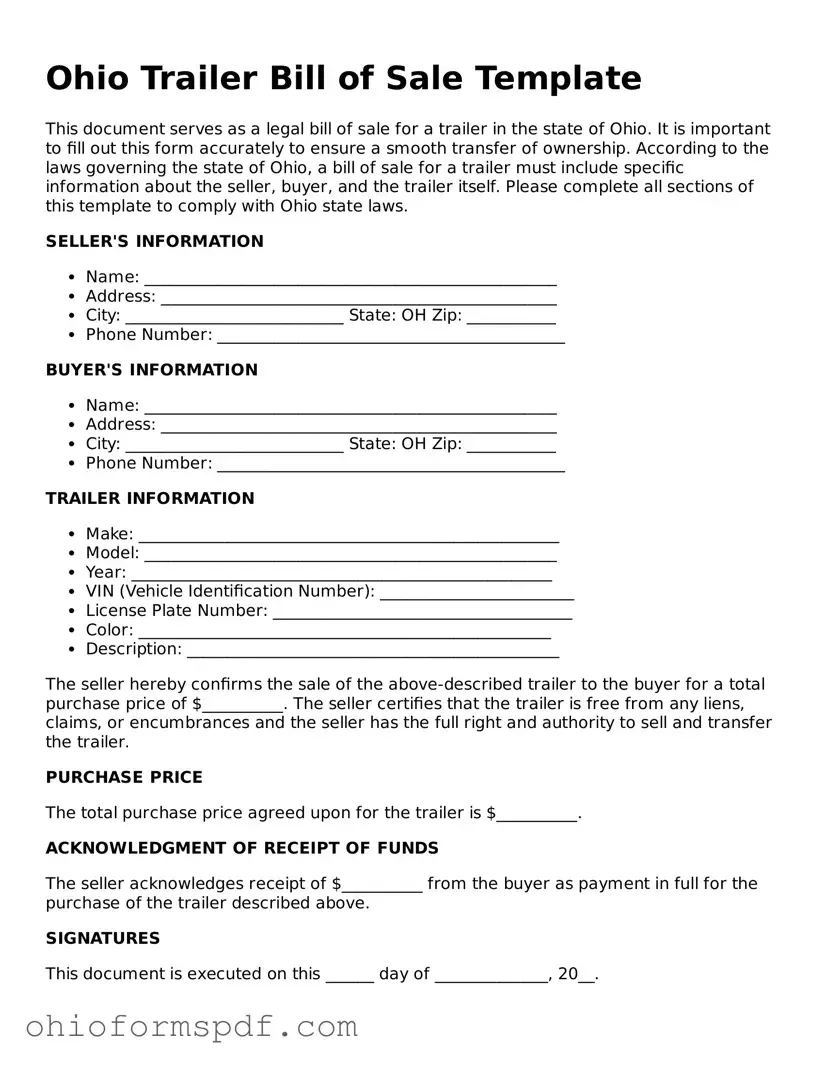What is an Ohio Trailer Bill of Sale form?
An Ohio Trailer Bill of Sale form is a legal document that records the sale of a trailer from one party, the seller, to another, the buyer. It provides proof of ownership change and contains vital information such as the buyer's and seller's names, the sale date, the price, and a detailed description of the trailer, including its make, model, year, and Vehicle Identification Number (VIN).
Is an Ohio Trailer Bill of Sale form required for registering a trailer?
Yes, in most cases, when registering a trailer in Ohio, you'll be required to present a bill of sale among other documents. This form acts as evidence of the transaction and helps the state's Bureau of Motor Vehicles (BMV) assess the appropriate taxes and fees.
What information should be included in an Ohio Trailer Bill of Sale?
An Ohio Trailer Bill of Sale should include the full names and addresses of both the seller and the buyer, the sale date, the sale amount, and specific details about the trailer such as its make, model, year, color, and VIN. For additional protection, it may also list any warranties or stipulations regarding the sale.
Do both parties need to sign the Ohio Trailer Bill of Sale?
Yes, both the seller and the buyer should sign the Ohio Trailer Bill of Sale. Their signatures, ideally in the presence of a notary public, verify that both parties agree to the terms of the sale and that the information on the bill of sale is accurate to the best of their knowledge.
Does the Ohio Trailer Bill of Sale form need to be notarized?
While not always mandated, it's highly recommended to have the Ohio Trailer Bill of Sale notarized. A notarized bill of sale provides another level of authenticity, ensuring that the signatures are verified and the document is more legally binding.
Can I create my own Ohio Trailer Bill of Sale form?
Yes, you can create your own Ohio Trailer Bill of Sale form. It must include all necessary information such as the transaction details, parties' information, and trailer description. However, using a standardized form or seeking legal advice ensures that the document complies with state requirements and holds up in legal situations.
What happens if I lose my Ohio Trailer Bill of Sale?
If you lose your Ohio Trailer Bill of Sale, it's advisable to contact the seller for a duplicate or draft a new one including all the original transaction details and having both parties re-sign it. Keeping a digital copy can prevent this issue.
Is a bill of sale the same as a title?
No, a bill of sale is not the same as a title. The bill of sale only documents the transaction and transfer of ownership. The title is an official document issued by the state that officially registers the trailer under the new owner's name.
How do I get an Ohio title with my Bill of Sale?
To get an Ohio title with your Bill of Sale, you'll need to submit the bill of sale, along with any other required documents, to the Ohio BMSA. This typically includes proof of insurance, a valid ID, and any forms related to the title transfer. The BMV will then process your application and issue a title in your name.
What should I do if the seller refuses to provide a Bill of Sale?
If the seller refuses to provide a Bill of Sale, it's advisable to reconsider the transaction. A bill of sale is crucial for documenting the transaction and protecting your rights as a buyer. Without it, proving ownership or resolving disputes could become significantly more challenging.

